46 releases
| 0.3.15 | Dec 24, 2022 |
|---|---|
| 0.3.14 | Dec 14, 2022 |
| 0.3.1 | Nov 13, 2022 |
| 0.2.21 | Nov 8, 2022 |
| 0.1.11 | Mar 28, 2022 |
#208 in Rendering
46 downloads per month
1MB
7.5K
SLoC
Realtime Path Tracer for Bevy
bevy-hikari is an implementation of global illumination for Bevy.
After Bevy releasing 0.8, the plugin moves to deferred hybrid path tracing.
For the old version (0.1.x) which uses voxel cone tracing with anisotropic mip-mapping, please check the bevy-0.6 branch.
🚧 This project is under heavily development. Certain passes are yet optimized, public interfaces may change between major versions, and minor versions may release very often.
⚠️ Notes:
- Please run examples with
--releaseflag to avoid the texture non-uniform indexing error - Please compile this libaray in release mode when using as a dependency
- Supported meshes must have these 3 vertex attributes: position, normal and uv
Bevy Version Support
bevy |
bevy-hikari |
|---|---|
| 0.6 | 0.1 |
| 0.8 | 0.2 |
| 0.9 | 0.3 |
Progress
- Extraction and preparation of mesh assets and instances
- Asynchronous building of acceleration structures
- G-Buffer generation
- N-bounce indirect lighting
- Transparency
- Next event estimation
- Better light sampling (L-BVH + Alias table)
- ReSTIR: Temporal sample reuse
- ReSTIR: Spatial sample reuse
- Spatiotemporal filtering
- Temporal anti-aliasing
- Spatial up-scaling (FSR 1.0)
- Temporal up-scaling (SMAA TU4X)
- Skinned animation
- HDR output
- Bloom
- Hardware ray tracing (upstream related)
Basic Usage
- Add
HikariPluginto yourAppafterPbrPlugin - Setup the scene with a directional light
- Insert
HikariSettingscomponent to the camera
One can configure the renderer through HikariSettings component on the camera entity.
Available options are:
pub struct HikariSettings {
/// The interval of frames between sample validation passes.
pub direct_validate_interval: usize,
/// The interval of frames between sample validation passes.
pub emissive_validate_interval: usize,
/// Temporal reservoir sample count is capped by this value.
pub max_temporal_reuse_count: usize,
/// Spatial reservoir sample count is capped by this value.
pub max_spatial_reuse_count: usize,
/// Max lifetime of a reservoir sample before being replaced with new one.
pub max_reservoir_lifetime: f32,
/// Half angle of the solar cone apex in radians.
pub solar_angle: f32,
/// Count of indirect bounces.
pub indirect_bounces: usize,
/// Threshold for the indirect luminance to reduce fireflies.
pub max_indirect_luminance: f32,
/// Clear color override.
pub clear_color: Color,
/// Whether to do temporal sample reuse in ReSTIR.
pub temporal_reuse: bool,
/// Whether to do spatial sample reuse for emissive lighting in ReSTIR.
pub emissive_spatial_reuse: bool,
/// Whether to do spatial sample reuse for indirect lighting in ReSTIR.
pub indirect_spatial_reuse: bool,
/// Whether to do noise filtering.
pub denoise: bool,
/// Which temporal filtering implementation to use.
pub taa: Taa,
/// Which upscaling implementation to use.
pub upscale: Upscale,
}
If you are unsure about some terms in these options, you could check render passes for details.
use bevy::prelude::*;
use bevy_hikari::prelude::*;
use std::f32::consts::PI;
fn main() {
App::new()
.add_plugins(DefaultPlugins)
.add_plugin(HikariPlugin {
remove_main_pass: true,
})
.add_startup_system(setup)
.run();
}
fn setup(
mut commands: Commands,
mut meshes: ResMut<Assets<Mesh>>,
mut materials: ResMut<Assets<StandardMaterial>>,
_asset_server: Res<AssetServer>,
) {
// Plane
commands.spawn(PbrBundle {
mesh: meshes.add(Mesh::from(shape::Plane { size: 5.0 })),
material: materials.add(Color::rgb(0.3, 0.5, 0.3).into()),
..default()
});
// Cube
commands.spawn(PbrBundle {
mesh: meshes.add(Mesh::from(shape::Cube { size: 1.0 })),
material: materials.add(Color::rgb(0.8, 0.7, 0.6).into()),
transform: Transform::from_xyz(0.0, 0.5, 0.0),
..default()
});
// Only directional light is supported
commands.spawn(DirectionalLightBundle {
directional_light: DirectionalLight {
illuminance: 10000.0,
..Default::default()
},
transform: Transform {
translation: Vec3::new(0.0, 5.0, 0.0),
rotation: Quat::from_euler(EulerRot::XYZ, -PI / 4.0, PI / 4.0, 0.0),
..Default::default()
},
..Default::default()
});
// Camera
commands.spawn((
Camera3dBundle {
// Set `camera_render_graph`
camera_render_graph: CameraRenderGraph::new(bevy_hikari::graph::NAME),
transform: Transform::from_xyz(-2.0, 2.5, 5.0).looking_at(Vec3::ZERO, Vec3::Y),
..Default::default()
},
// Add [`HikariSettings`] component to enable GI rendering
HikariSettings::default(),
));
}
Custom Materials
bevy-hikari is built based on bevy's PBR standard material.
A material that is eligible for lighting needs to have surface properties a StandardMaterial has (base color, metallic, etc).
In order to render with custom materials,
- Implement
Into<StandardMaterial>for the materialCustomMaterial, and - Add
GenericMaterialPlugin::<CustomMaterial>::default()to the app - Add
GenericInstancePlugin::<CustomMaterial>::default()to the app
Screenshots
Here are the screenshots of examples.
Simple
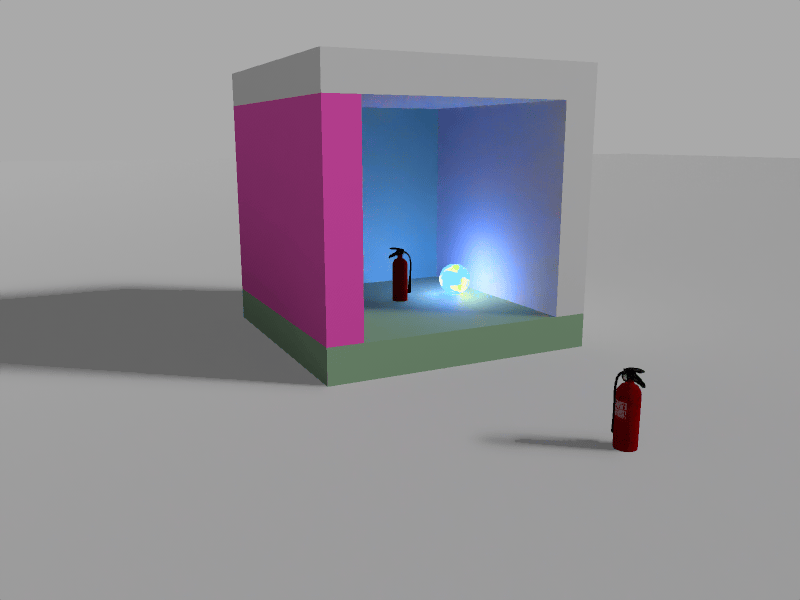
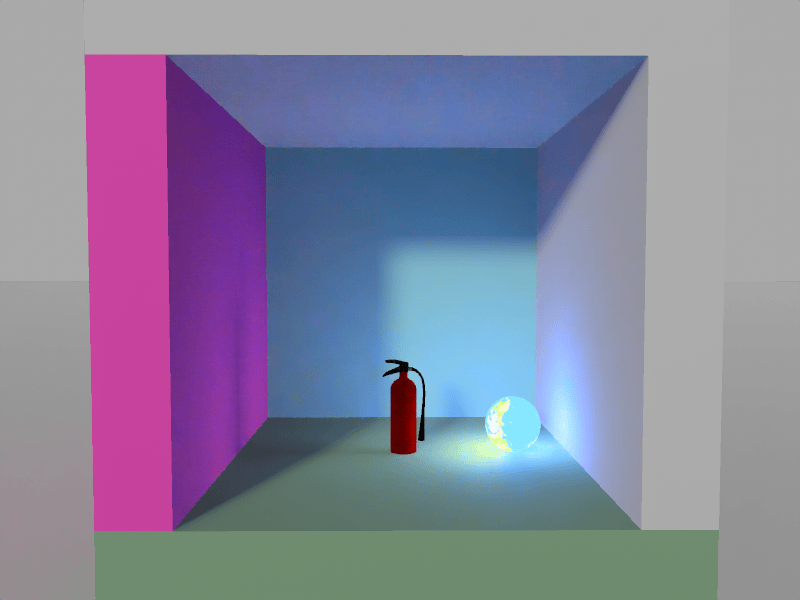
Cornell (2 Indirect Bounces)

City (Song Dynasty)

Scene (WW2)

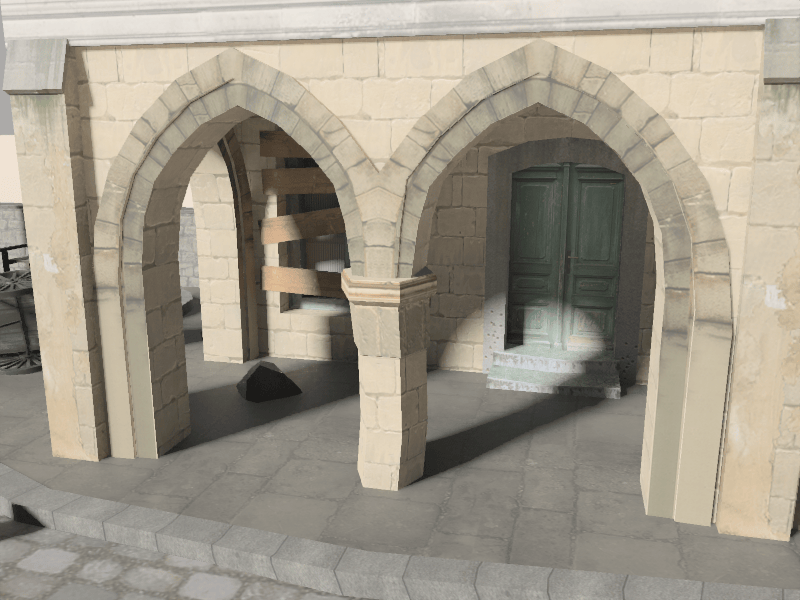
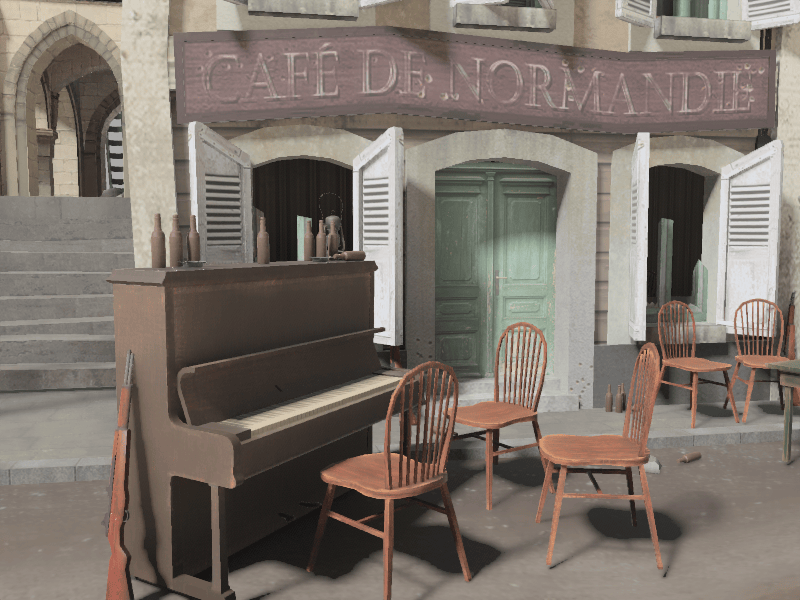

Render Passes
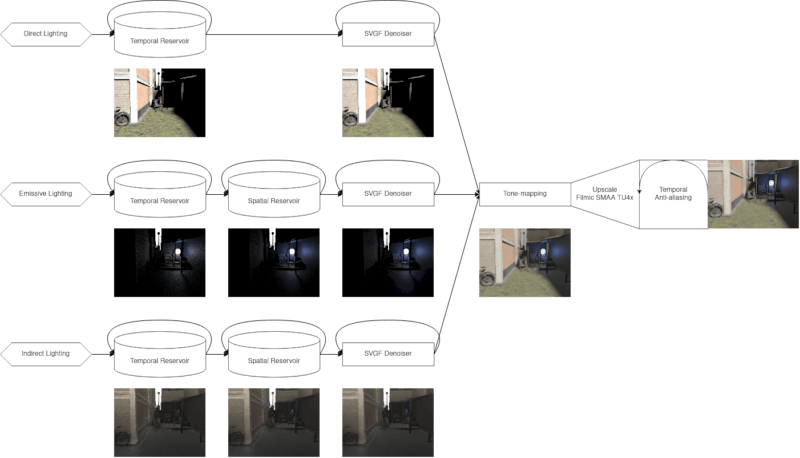
License
Just like Bevy, all code in this repository is dual-licensed under either:
- MIT License (LICENSE-MIT or http://opensource.org/licenses/MIT)
- Apache License, Version 2.0 (LICENSE-APACHE or http://www.apache.org/licenses/LICENSE-2.0)
at your option.
Credits
- "Fire Extinguisher" model and textures by Cameron 'cron' Fraser.
- "WW2 City Scene" from sketchfab.
- "Song Dynasty Architectures" by 唐晨.
References
- ReSTIR: https://cs.dartmouth.edu/wjarosz/publications/bitterli20spatiotemporal.pdf
- ReSTIR GI: https://d1qx31qr3h6wln.cloudfront.net/publications/ReSTIR%20GI.pdf
- GRIS: https://d1qx31qr3h6wln.cloudfront.net/publications/sig22_GRIS.pdf
- SVGF: https://cg.ivd.kit.edu/publications/2017/svgf/svgf_preprint.pdf
- Filmic SMAA TU: https://www.activision.com/cdn/research/Dynamic_Temporal_Antialiasing_and_Upsampling_in_Call_of_Duty_v4.pdf
Dependencies
~35–49MB
~824K SLoC